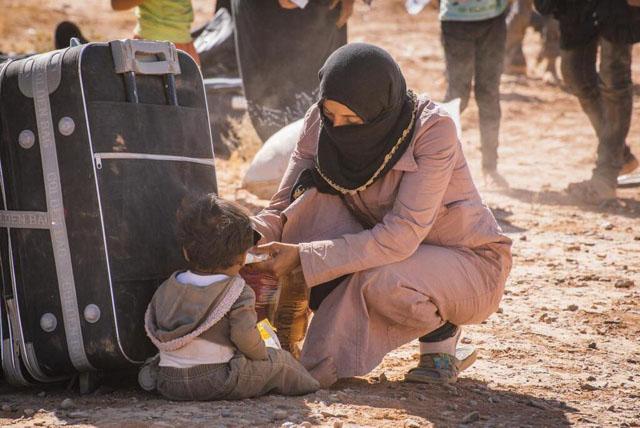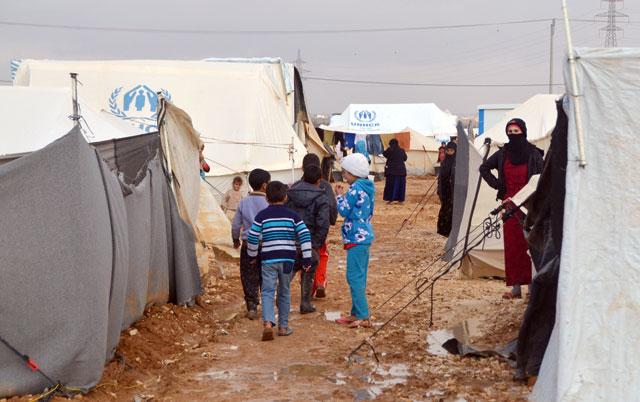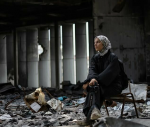You are here
Jordan’s agricultural exports drop by 25% due to Syrian crisis — report
By Khetam Malkawi - Jul 09,2014 - Last updated at Jul 09,2014

AMMAN — The Syrian crisis and the influx of refugees to Jordan have disrupted agriculture and food trade, leading to losses in exports to the neighbouring country, according to an international report.
The UNDP-ODI report, titled “Towards a resilience-based response to the Syrian refugee crisis”, said the crisis led to a 25 per cent decrease in Jordan’s agricultural exports to Syria and a 30 per cent decline in agricultural imports, thereby affecting farmers and traders.
Launched on Tuesday, the study said the vast majority of Syrian refugees (97 per cent) have gone to countries in the surrounding region. They are spread amongst Lebanon (38 per cent), Turkey (25 per cent), Jordan (23 per cent), Iraq (9 per cent) and Egypt (5 per cent).
Public finances in Jordan and Lebanon were structurally weak prior to the crisis, affecting their capacity to deal with the negative fiscal impacts of the combined shocks, the UNDP said.
The influx of refugees, according to the report led to two shocks.
In Jordan, the first shock is demographic, due to the influx of the refugees, and has resulted in fiscal impacts such as increased government expenditures, increased subsidy costs and an increased budget deficit, according to the report.
The second shock is economic.
“Commerce with Syria has been cut dramatically, affecting the economies of neighbouring countries and also individuals who turned to Syria as a source of employment, goods and services,” the report said.
The fiscal impact of the crisis on the Kingdom’s education, health, electricity and water sectors exceeded $850 million in just two years (2012-2013), it added.
Moreover, Jordan has responded to the fiscal shortfall by making cuts in essential subsidies needed for the welfare of poor and vulnerable households, according to a UNDP statement issued with the report.
In Jordan there are more than 600,000 Syrian refugees, with 80 per cent of them residing in host communities, adding more pressure to the country’s resources.
Earlier this month, the UNHCR and the government called on the international community to step up assistance to enable Jordan to deal with the impact of the crisis.
The UNHCR said it has received only 40 per cent of the funds needed until the end of the year to continue providing services for Syrians.
According to UNHCR Representative to Jordan Andrew Harper, the funds received so far might be enough until August, as there is a $600 million shortfall in the $1 billion that the UN agency requested for the year.
“We are concerned that funding is not going at the same pace as the number of refugees is increasing,” Harper said last week at a joint press conference with Planning Minister Ibrahim Saif.
Saif said Jordan is committed to continuing hosting Syrian refugees, but with a lack of funds, the country can “only… provide the minimum help”.
He added that Jordan “can’t sustain the same level of services” as “we have our economic worries and issues that are increasing with hosting the refugees”.
Commenting on the resilience report, Gustavo Gonzalez, UNDP sub-regional development coordinator for the Syria crisis, warned of tensions between Syrian refugees and host communities.
“There is a dark side to the crisis, represented by the still silent tensions between Syrian refugees and their host populations competing for resources and livelihoods,” he said.
“The crisis therefore cannot be purely handled with humanitarian assistance. A resilience-based approach that complements humanitarian efforts is very much needed to address, for instance, social cohesion issues,” the UN official said in a statement sent to The Jordan Times.
Related Articles
Development partners from 18 countries and the EU on Wednesday agreed that the January 15 Kuwait II Pledging Conference for Syria should encompass support for critical development efforts to complement the humanitarian response to the crisis in Syria and its spill-over impacts on neighbouring countries, according to a UNDP statement.
Jordan on Sunday reiterated its appreciation for the UN's support especially in the areas of humanitarian assistance and relief aid as well as development programmes.
After a field visit to the Kingdom, executive boards of UN agencies reiterate the need to sustain supporting Jordan in bearing the burden of hosting Syrian refugees.

















